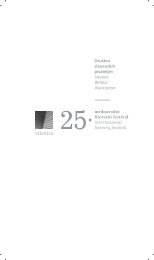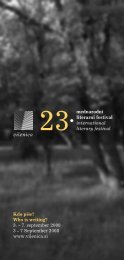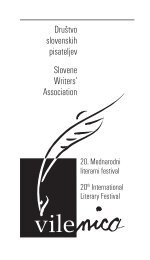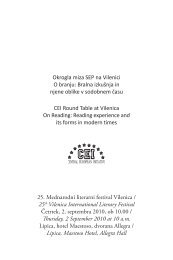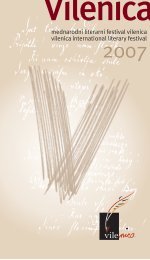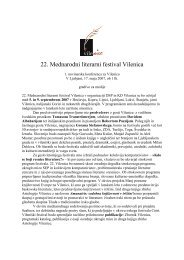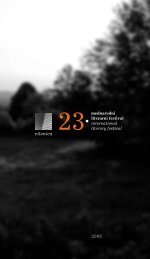Publikacija SEP 2011 - Vilenica
Publikacija SEP 2011 - Vilenica
Publikacija SEP 2011 - Vilenica
Create successful ePaper yourself
Turn your PDF publications into a flip-book with our unique Google optimized e-Paper software.
and detective novels (too cerebral: much as I’d recently been enjoying<br />
the Darwinian renaissance and re-reading classic crime stories, I felt that<br />
a detailed account of selfish genes and the criminal mind would not be<br />
the right medicine.) I toyed with the idea of startling the nurses with Kierkegaard’s<br />
Pain and Suffering: The Sickness Unto Death. But no: what I<br />
wanted was the equivalent of comfort food, something I’d once enjoyed<br />
and could repeatedly and effortlessly revisit, something that could be<br />
read for pleasure alone but that would, at the same time, keep my brain<br />
alight and humming. I asked my partner to bring me my two volumes<br />
of Don Quixote de la Mancha.<br />
Lars Gustafsson, in his moving novel Death of a Beekeeper, has his<br />
narrator, Lars Lennart Westin, who is dying of cancer, make a list of<br />
art forms according to their level of difficulty. Foremost are the erotic<br />
arts, followed by music, poetry, drama and pyrotechnics, and ending<br />
with the arts of building fountains, fencing and artillery. But one art<br />
form cannot be fitted in: the art of bearing pain. “We are therefore<br />
dealing with a unique art form whose level of difficulty is so high,”<br />
says Westin, “that no one exists who can practise it.” Westin, perhaps,<br />
had not read Don Quixote. Don Quixote is, I discovered with relief, the<br />
perfect choice for bearing pain. Opening it almost anywhere, while<br />
waiting to be prodded and pinched and drugged, the friendly voice<br />
of the erudite Spanish soldier comforted me with its reassurance that<br />
all would be well in the end. Because ever since my adolescence, I’ve<br />
kept going back to Don Quixote, I knew I wasn’t going to be tripped<br />
up by the prodigious surprises of its plot. And, since Don Quixote is a<br />
book that can be read just for the pleasure of its invention, simply for<br />
the sake of the story, without any obligation of studiously analysing its<br />
conundrums and rhetorical digressions, I could allow myself to drift<br />
peacefully away in the narrative flow, following the noble knight and<br />
his faithful Sancho. To my first high school reading of Don Quixote,<br />
guided by professor Isaias Lerner, I have, over the years, added many<br />
other readings, in all sorts of places and all sorts of moods. I read Don<br />
Quixote during my early years in Europe, when the echoes of May 68<br />
seemed to announce huge changes into something still unnamed and<br />
71





